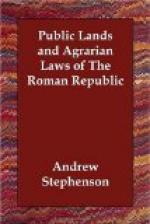It is easy to comprehend the effect of a law so conceived. On the one hand it guaranteed to the possessors full property in the public lands which they held. From this point of view it was aristocratic. But on the other hand it aimed to unite the interests of the common people with those of the aristocracy, by placing a tax of one tenth of the produce upon the holders of these lands,[12] thus reestablishing the law which had been annulled by Drusus. This took the place of distributions of land, which had now been made impossible[13] in Italy. In reality this law was disastrous to the plebeians as it established a tax[14] for their benefit, a congiarium, and placed a premium upon laziness.
The narration of Appian presents some grave difficulties. In all the manuscripts of Appian the name of the tribune proposing the second law is Spurius Borius.[15] Cicero mentions a tribune by the name of Spurius[16] Thorius and Schweighaeuser in his edition of Appian has changed ‘Borius’ to ‘Thorius.’ But this does not lessen the difficulty, as the law which Cicero attributes to Thorius is entirely different from the second law of Appian which, according to him was introduced by Spurius Borius. Cicero says that Spurius Thorius “freed the public lands from the vectigal."[17] Appian says that Spurius Borius guaranteed the possessions in the public lands, levying a tax on them for the benefit of the people. It is a sheer waste of time to attempt to harmonize these two statements.[18] Granting that Spurius Borius and Spurius Thorius are one and the same person, the statements still remain diametrically opposed according to a simple and commonly accepted translation of Cicero’s words: “Sp. Thorius satis valuit in populari genere dicendi, is qui agrum publicum vitiosa et inutile lege vectigali levavit.” Mommsen makes Cicero agree with Appian by changing “vectigali” into the instrument, and rendering[l9] “relieved the public land from a vicious and useless law by imposing a vectigal.” No other writer agrees with Mommsen in making such a translation.
3. The third law is mentioned by Appian alone who says: “Now when the law of Gracchus had once been evaded by these tricks, an excellent law and most useful to the state if it could have been executed, another tribune not long after [Greek: oupolu husteron] abolished even the vectigalia."[20] This is evidently the same law which Cicero mentions as that of Spurius Thorius and as he also mentions him in another place (De Or., II, 70, 284), we may possibly accept him as the author.
There are still extant some fragments of a bronze tablet which contains upon its smooth surface the Lex Repetundarum and has cut upon its rough[21] back an agrarian law. These fragments were discovered in the 16th century among the collections in the Museum of Cardinal[22] Bembo at Padua. Sigonius attempted the reconstruction of this law and after him Haubold and Klentze, but Rudorff has completed the reconstruction




